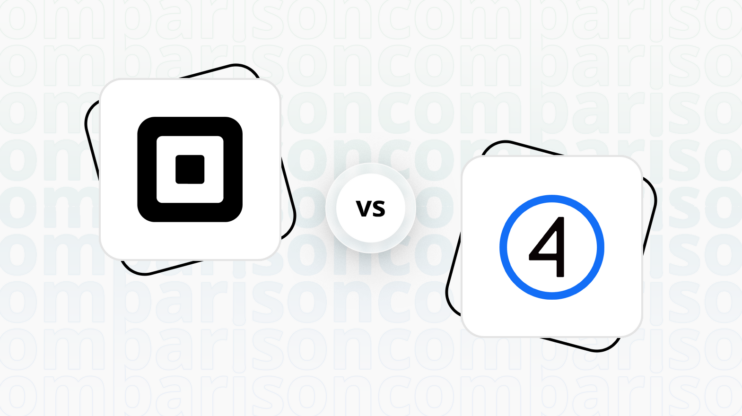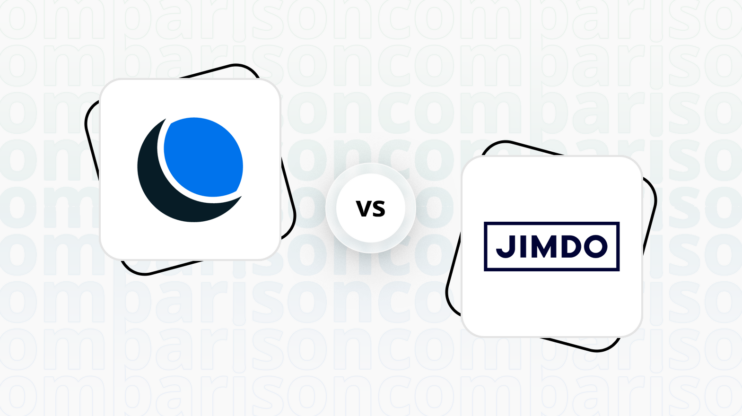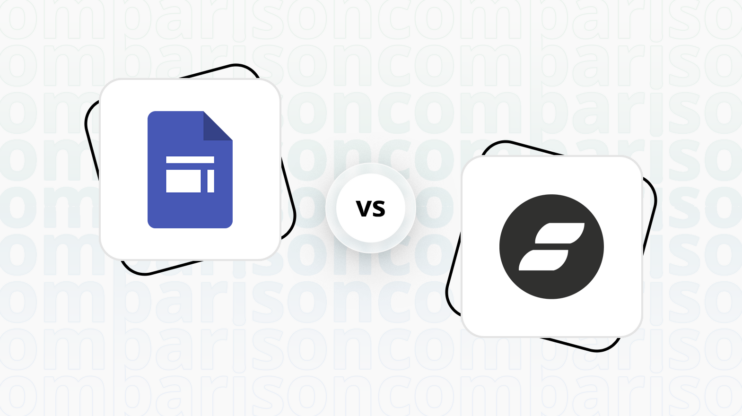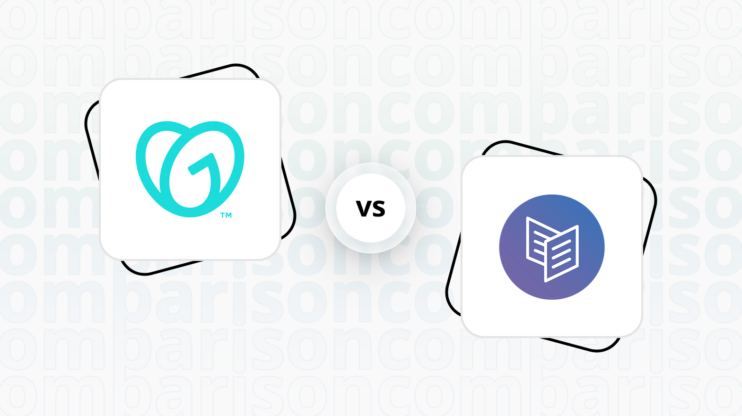Final verdict
Google Sites vs Duda offers a clear distinction in terms of functionality and target audience.
-
Google Sites (Overall Grade: 5.6/10)
is ideal for users seeking simplicity and seamless integration with Google Workspace tools. It excels in collaborative features, making it a popular choice for team projects, personal portfolios, and small business websites. However, it lacks advanced ecommerce capabilities and extensive customization options, which may limit its appeal for more complex website needs. -
Duda (Overall Grade: 7.8/10)
stands out with its professional and responsive website building capabilities. It offers a wide range of customizable templates, advanced ecommerce features, and robust hosting solutions. Duda is particularly well-suited for agencies, designers, and businesses looking for a comprehensive and flexible platform to create and manage multiple client websites.

|

|
|
|---|---|---|
|
Design functionalities & templates |
4.9 |
8.3 |
|
Ease of use |
8.3 |
8.4 |
|
Ecommerce |
1.8 |
7.4 |
|
Website Editors |
7.0 |
8.3 |
|
Product testing options |
6.9 |
8.4 |
|
Price |
8.1 |
7.9 |
|
Hosting quality |
8.2 |
8.8 |
|
Website speed optimization |
3.3 |
7.6 |
|
Plugins and integrations |
6.4 |
7.7 |
|
Marketing features |
2.6 |
7.1 |
|
Customer support |
7.2 |
7.5 |
|
Security |
9.3 |
8.6 |
|
AI capabilities |
0 |
7.3 |
|
User Management |
7.8 |
8.0 |
Best for ecommerce
 1.8
1.8
 7.4
7.4
Verdict
: Google Sites is not designed for ecommerce, while Duda offers a comprehensive suite of ecommerce tools, making it the better choice for online stores.
-
Google Sites
: Google Sites is primarily a tool for creating simple websites and lacks built-in ecommerce features. Users must rely on third-party tools or widgets to add ecommerce functionalities, which can be cumbersome and limited. When comparing Google Sites vs Duda, Google Sites falls short in supporting robust ecommerce operations. -
Duda
: Duda excels in ecommerce with features like product and inventory management, payment processing, and advanced SEO and marketing tools. It provides a range of customizable templates and supports various payment gateways, making it a strong contender for businesses looking to establish a professional online store.
Best for informational & business websites
 7.2
7.2
 8.4
8.4
Verdict
: When it comes to creating informational and business websites, Duda takes the lead with its extensive customization options, professional templates, and robust hosting capabilities. Google Sites, while user-friendly and well-integrated with Google Workspace, falls short in comparison to Duda’s comprehensive feature set.
-
Google Sites
: Google Sites is a straightforward, no-code website builder that integrates seamlessly with Google Workspace tools. It is ideal for users who need a simple, collaborative platform for creating team projects, personal portfolios, or small business websites. However, its limited template variety and basic design functionalities make it less suitable for more complex business needs. Google Sites scores 7.2 in this category. -
Duda
: Duda excels with its professional and responsive website templates, extensive customization options, and powerful hosting on AWS. It is particularly well-suited for agencies, designers, and businesses that require a more sophisticated online presence. Duda’s platform offers a range of features, including ecommerce capabilities and SEO tools, making it a versatile choice for various business needs. Duda scores 8.4 in this category.
Detailed comparison
Design functionalities & templates
Design FunctionalitiesRepresents how well each platform allows for creative design and customization of websites.Score Components:
- Template Variety (30%): Range and quality of design templates.
- Customization (30%): Flexibility and options for design alterations.
- User Interface (20%): Ease and intuitiveness of the design process.
- Responsiveness (10%): Adaptability to different devices and screen sizes.
- Innovation (10%): Unique design features and tools.
 4.9
4.9
 8.3
8.3
🏆
Winner: Duda.
Duda offers more variety in templates and design, more customization flexibility, better mobile responsive design, more creative design possibilities, and more free and premium templates and designs than Google Sites.
Google Sites offers a limited number of templates suitable for various purposes, from personal blogs to business websites. These templates are designed for user engagement, simplicity, and functionality, allowing for customization to meet specific needs.
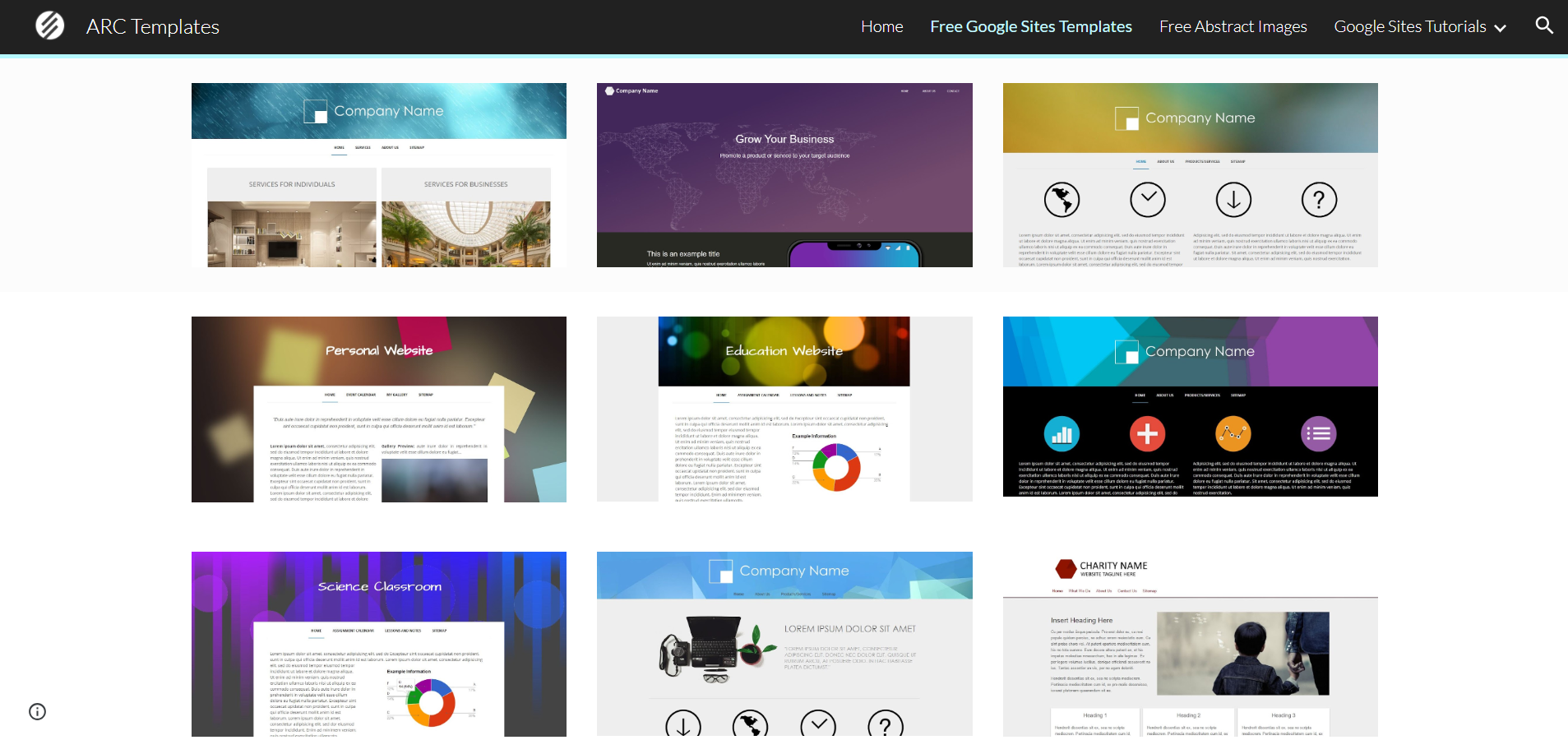

On the other hand, Duda offers a wide variety of templates and designs for its website builder. With over 180 templates to choose from, users have the flexibility to create a website that suits their unique needs and style. The templates are professionally designed and cover various industries, ensuring that businesses of all types can find a suitable option.


Get a head start on website creation with AI
Create a custom website tailored to your business needs 10X faster with 10Web AI Website Builder!
Ease of use
Ease of useReflects the platform’s overall user-friendliness.Score
Components:
- Learning curve (40%): Quickness and ease of getting started.
- Interface design (30%): Simplicity and intuitiveness of layout.
- User guidance (20%): Quality of tutorials and support.
- Flexibility (10%): Adaptability to various user skills.
 8.3
8.3
 8.4
8.4
🏆 Winner: Duda
. With a score of 8.4, Duda slightly edges out Google Sites, which scored 8.3. Duda is praised for its intuitive user interface, extensive customizable templates, and collaboration tools, making it a great choice for agencies, teams, and professionals who need efficient design tools. Google Sites, on the other hand, is ideal for users seeking simplicity and integration with Google Workspace tools.
Learning Resources
Both Google Sites and Duda offer extensive learning resources. Google Sites provides practical guides and comprehensive digital skill development programs, while Duda offers a wide range of documentation, video tutorials, and an active community forum.
For ecommerce
EcommerceMeasures the platform’s effectiveness in supporting online business activities.Score Components:
- Ecommerce themes and templates (20%): Variety and design of templates.
- Product management (25%): Ease of managing and organizing products.
- Payment options (25%): Variety and convenience of payment methods.
- Ecommerce features (20%): Features for managing an ecommerce store.
- Integration (10%): Compatibility with external e-commerce tools and services.
 1.8
1.8
 7.4
7.4
When it comes to ecommerce, Duda clearly outperforms Google Sites. Google Sites does not have built-in ecommerce features and relies on third-party tools or widgets for ecommerce functionalities. In contrast, Duda offers a comprehensive set of ecommerce features, including product and inventory management, payment processing, shopping and tax settings, coupons and discounts, SEO and marketing tools, and analytics and reporting.

|

|
|
|---|---|---|
|
Ecommerce themes and templates |
0.0 |
6.5 |
|
Product page customization |
0.0 |
7.5 |
|
Payment processing and commissions |
1.0 |
7.0 |
|
POS capabilities |
0.0 |
5.5 |
|
Payment gateways |
2.0 |
7.5 |
|
Product numbers |
0.0 |
7.0 |
|
Additional ecommerce features |
0.5 |
7.0 |
Google Sites ecommerce features:
Google Sites itself does not have built-in eCommerce features. However, you can integrate eCommerce functionalities into a Google Sites website by embedding third-party tools or widgets, linking to an external eCommerce platform, or using buttons that link to payment processors.
Duda ecommerce features:
- Product and Inventory management
- Payment processing
- Shopping and Tax settings
- Coupons and discounts
- SEO and Marketing tools
- Analytics and reporting
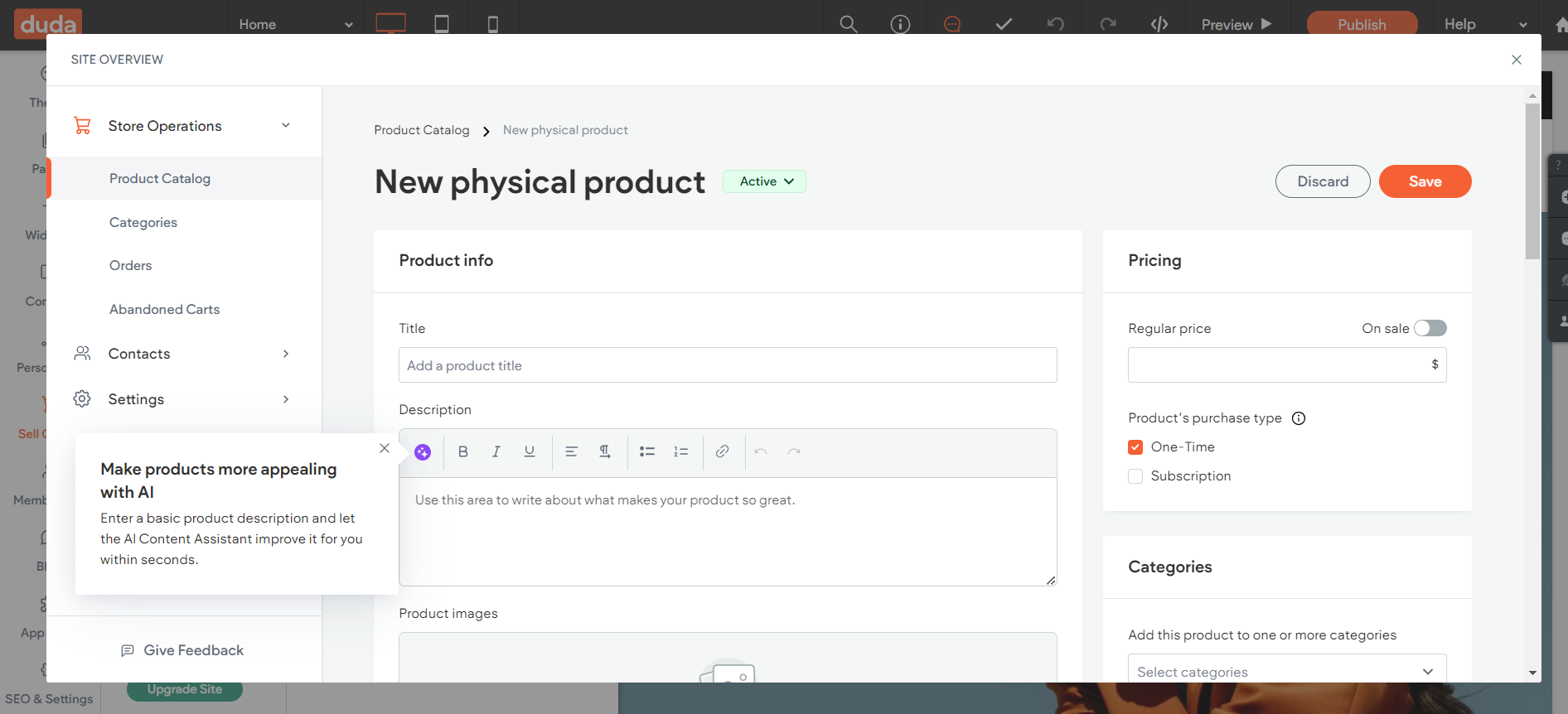
Ecommerce themes & templates
Google Sites does not offer any ecommerce templates. On the other hand, Duda provides a variety of ecommerce templates designed to help businesses create professional, responsive online stores. These templates are specifically tailored to support a wide range of ecommerce functionalities such as product catalogs, shopping carts, checkout processes, and payment gateways integration.
Product page customization
Google Sites lacks any product page customization features, as the products can be listed with embedding third-party platforms, all the customization can be done within the mentioned platforms. In contrast, Duda allows for easy addition of variations such as size and color directly from the product management section. It also offers bulk import/export functionality through CSV files, streamlining the process for managing large inventories and reducing the risk of manual entry errors.
Payment processing
Google Sites does not have native payment processing features but allows for the integration of payment gateways using external tools or links. This can be done by embedding HTML code for payment buttons from services like PayPal, Square, or Stripe, or by linking to an external checkout page. On the other hand, Duda integrates with Stripe and PayPal for payment processing, offering various methods like credit cards and AliPay. It also allows integration with third-party payment providers for flexibility and supports client billing using Stripe. Overall, Duda offers comprehensive ecommerce features, including over 30 payment provider integrations.
Website Editors
Website EditorsEvaluates the platforms’ website building and editing capabilities.Score Components:
- Customization tools (40%): Range and power of editing features.
- Editor usability (30%): User experience within the editor.
- Design flexibility (20%): Freedom in layout and design changes.
- Update and maintenance ease (10%): Simplicity of updating and maintaining the site.
 7.0
7.0
 8.3
8.3
🏆
Winner: Duda
. Duda, with a score of 8.3, offers a user-friendly platform designed for creating responsive websites with ease. It features a drag-and-drop interface, a wide range of customizable templates, and integrated SEO and marketing tools. The platform also offers ecommerce capabilities, collaborative tools for client management, and ensures websites are optimized for all devices. Hosting and security are taken care of by Duda, providing a comprehensive solution for building and managing professional websites efficiently.
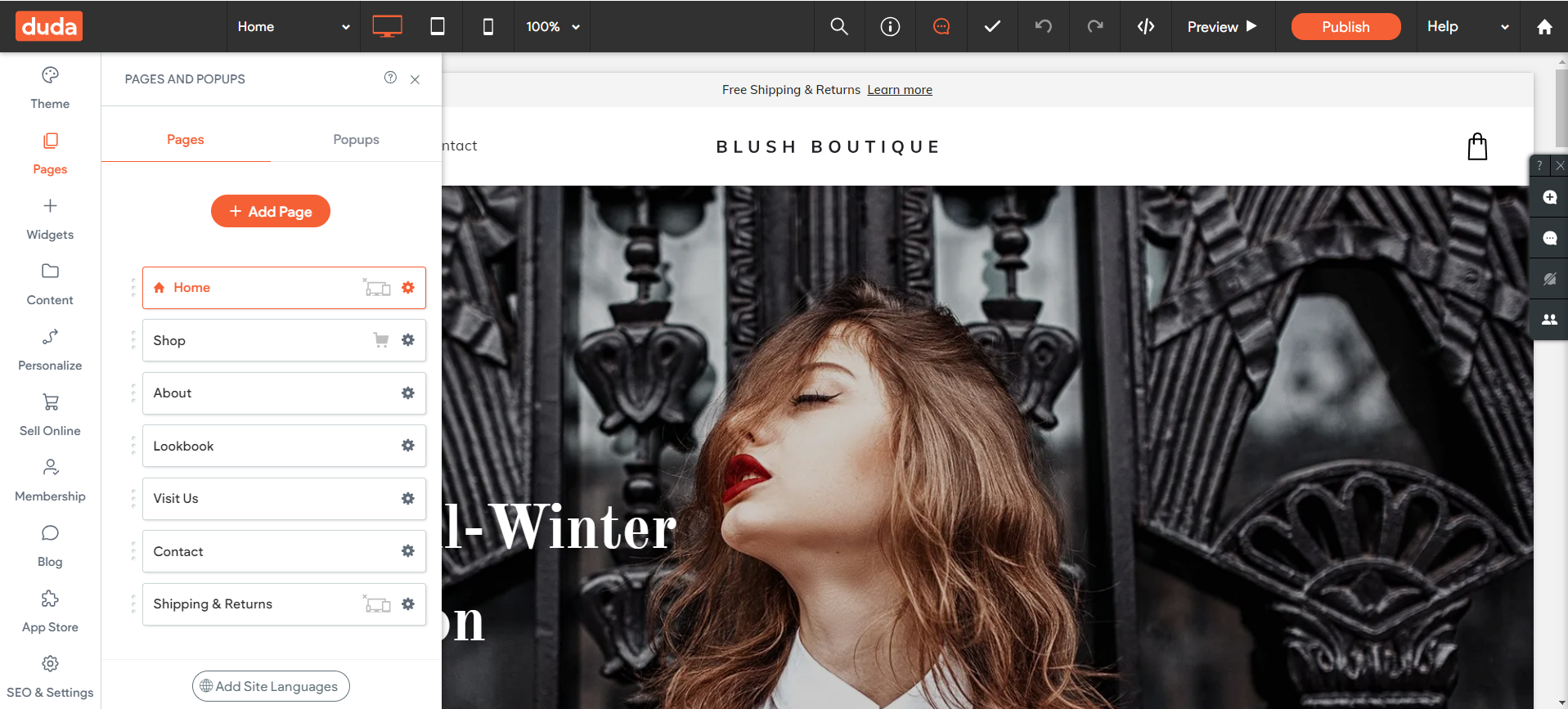
Google Sites, scoring 7.0, offers a user-friendly website builder editor that allows users to create and design websites without needing coding knowledge. With its drag-and-drop interface, users can easily add, customize, and arrange elements such as text, images, and videos on their web pages. It also provides a variety of templates and design options to help users get started quickly and ensure their site looks professional. Additionally, Google Sites integrates seamlessly with other Google services, enabling the incorporation of Google Docs, Sheets, Slides, and Maps directly into the website.
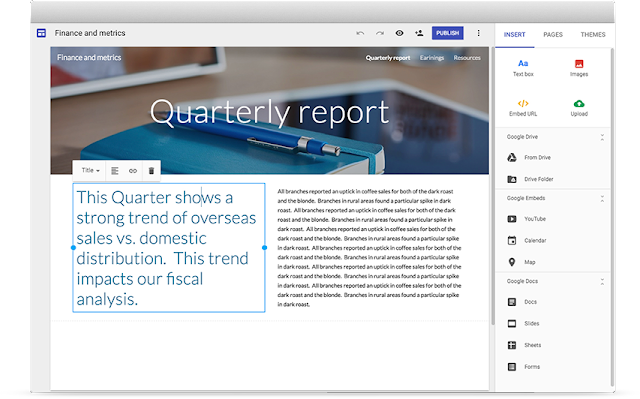
Mobile editor/app
 0
0
 5.5
5.5

🏆
Winner: Duda
. Both Google Sites and Duda do not offer a dedicated mobile editor app. However, Duda has an edge over Google Sites as it supports limited mobile editing through its platform, allowing users to make edits and republish sites directly from mobile devices. On the other hand, Google Sites does not provide any mobile editing capabilities. Therefore, Duda is the better choice for users who need to make quick changes to their websites on the go.
Product testing options
Product Testing OptionsAssesses the options for trying out platform features before commitment.Score Components:
- Trial quality (40%): Extent and usefulness of the trial or free version.
- Feature accessibility (30%): How many features are available to test.
- Trial duration (20%): Length of the trial period.
- Ease of transition (10%): Smoothness of moving from trial to paid plans.
 6.9
6.9
 8.4
8.4
Overall Result
:
Duda Wins
. Duda scores 8.4 in product testing options, outperforming Google Sites which scores 6.9. Duda offers a 14-day free trial with access to all features of each plan, providing a comprehensive testing experience. In contrast, Google Sites also offers a 14-day free trial, but only allows testing of some premium features. Additionally, Duda provides a 30-day money-back guarantee, while Google Sites does not offer this.

|

|
|
|---|---|---|
|
Free Plan |
Yes | No |
|
Trial Duration |
14 days | 14 days |
|
Testing Premium Features |
Some features during free trial |
All features during free trial |
|
Money Back Guarantee |
No |
30 days |
Price
PriceLooks at the cost-effectiveness and value for money of each platform.Score Components:
- Plan value (40%): What each pricing tier offers.
- Transparency and clarity (30%): Clearness of pricing structures.
- Flexibility of plans (20%): Range of options to suit different budgets.
- Hidden costs (10%): Additional expenses not included in the plan.
 8.1
8.1
 7.9
7.9
Google Sites and Duda offer a range of pricing options to cater to different user needs.

|

|
|
|---|---|---|
|
$0-$10 |
Business Starter ($7.20/month): This plan includes basic features suitable for individuals or small businesses, offering professional email through Gmail, 30GB of storage per user, and video meetings for up to 100 participants. It allows to manage 1 website and there is no limitation on number of pages. Value for price: 6.0 |
No offering at this amount. |
|
$10-$20 |
Business Standard ($14.40/month): Suitable for growing businesses, this plan provides 2 TB of storage per user, video meeting capacity for up to 150 participants with recording features, and access to smart booking pages and shared drives. It allows to manage 1 website and there is no limitation on number of pages. Value for price: 7.5 |
No offering at this amount. |
|
$20-$30 |
Business Plus ($21.60/month): Designed for larger businesses needing more robust capabilities, offering 5 TB of storage per user, advanced security options, and video meetings for up to 500 participants. It allows to manage 1 website and there is no limitation on number of pages. Value for price: 8.5 |
Basic ($25/month): Includes hosting for one website with email support, 99.99% uptime, and access to Duda’s AI Content Assistant. Value for price: 6.0 |
|
$30-$40 |
No offering at this amount. |
Team ($39/month): Adds up to three team members, priority email, chat, and phone support, with team and client management features. Value for price: 7.0 |
|
$60-$70 |
No offering at this amount. |
Agency ($69/month): Offers hosting for up to four websites with priority support, account management, and access to advanced features. Value for price: 8.0 |
|
$100+ |
No offering at this amount. |
White Label ($199/month): For those needing to offer Duda under their own branding, including all Agency features plus white-label client access. Value for Price: 9.0 |
location. As a result in rare cases the prices displayed here can differ from the ones you see on their
websites.
Hosting quality
Hosting
qualityExamines the reliability and performance of the hosting solutions.Score Components:
- Uptime (40%): Consistency and reliability of website availability.
- Speed (30%): Loading times and performance.
- Bandwidth and storage (20%): Sufficiency of resources provided.
- Data centers (10%): Quality and distribution of hosting infrastructure.
 8.2
8.2
 8.8
8.8
🏆
Winner: Duda
Duda’s hosting solution, powered by Amazon Web Services (AWS), offers high speed and unlimited storage or bandwidth. With a 99.99% uptime guarantee, it outperforms Google Sites, which offers basic storage and relies on Google Drive for backup functionalities. Duda’s robust hosting capabilities earn it a higher rating in this category.

|

|
|
|---|---|---|
|
Do they offer hosting? |
Yes, basic storage with 100MB free per site, can be increased by upgrading to Google Workspace |
Yes, robust hosting solutions on Amazon Web Services (AWS) with high speed, and no storage or bandwidth limitations |
|
Data Centers: |
Google operates a total of 21 data centers across the globe: 2 in Asia, 5 in Europe, 13 in US and 1 in South America |
Duda relies on Amazon Web Services (AWS) |
|
Type of hosting: |
Cloud based managed hosting |
AWS Cloud Hosting |
|
Uptime: |
99.9% |
99.99% |
|
Uptime Guarantee: |
Yes, 99.9% |
Yes, 99.99% |
Website Speed Optimization
Website Speed OptimizationEvaluates optimization of website loading timesScore Components:
- PageSpeed Score (30%): Google’s score indicating performance optimization.
- Loading Time (30%): The average time until a website is fully interactive.
- Mobile Optimization (15%): Optimization effectiveness for mobile devices.
- Resource Optimization (15%): Optimizing images, scripts, and other heavy resources.
- CDN Usage (10%): Use of CDN to enhance speed across geolocations.
 3.3
3.3
 7.6
7.6
🏆 Winner: Duda
Both Google Sites and Duda prioritize website performance and page speed, but Duda’s efficient code and file minification, CDN, image optimization, and mobile-responsive designs give it an edge over Google Sites.

|

|
|
|---|---|---|
|
Focus |
Automated Optimization, CDN, Mobile Optimization, Browser Caching, Code Minification, Use of AMP |
Efficient Code and File Minification, CDN, Image Optimization, Mobile-Responsive Designs and AMP Support |
|
Performance Tools |
Google Lighthouse, PageSpeed Insights |
Google PageSpeed Insights Integration |
|
Key Strategies |
Automated Optimization, CDN, Mobile Optimization, Browser Caching, Code Minification, Use of AMP |
Efficient Code and File Minification, CDN, Image Optimization, Mobile-Responsive Designs and AMP Support |
|
Load Times |
Google does not disclose statistics about website Page Speed scores, or load times |
Both load times and Page speed scores varies widely, depending on the optimization and user’s location |
|
Page Speed Scores Range |
Google does not disclose statistics about website Page Speed scores, or load times |
Both load times and Page speed scores varies widely, depending on the optimization and user’s location |
|
Core Web Vitals Improvement |
Emphasis on LCP, FID, CLS improvements |
Emphasis on LCP, FID, CLS improvements |
Duda’s approach to enhancing site speed includes efficient code and file minification, use of a content distribution network (CDN), image optimization, and mobile-responsive designs. Duda also supports Accelerated Mobile Pages (AMP), which can significantly improve the performance of mobile web pages. However, both load times and PageSpeed scores can vary widely, depending on the level of optimization and the user’s location.
Google Sites also places a strong emphasis on website performance and page speed. Its approach to enhancing site speed includes automated optimization, use of a CDN, mobile optimization, browser caching, code minification, and the use of AMP. However, Google does not disclose specific statistics about website PageSpeed scores or load times. Like Duda, Google Sites also places an emphasis on improving Core Web Vitals (LCP, FID, CLS).
Get a head start on website creation with AI
Create a custom website tailored to your business needs 10X faster with 10Web AI Website Builder!
Plugins and integrations
Plugins and integrationsMeasures the range and effectiveness of additional plugins and integrations.Score Components:
- Variety of options (40%): Range of available add-ons.
- Integration smoothness (30%): Ease of integrating plugins into the site.
- Quality of plugins (20%): Functionality and reliability of the options.
- Custom integration capabilities (10%): Support for custom or third-party integrations.
 6.4
6.4
 7.7
7.7
🏆 Winner: Duda.
With a score of 7.7, Duda leads over Google Sites, which scores 6.4. Duda offers built-in widgets, app integrations, and the ability to create custom widgets, which are included in various Duda plans, eliminating the need for separate plugin costs. Google Sites, on the other hand, offers a wide array of plugins and extensions to enhance website functionality, but falls short in comparison to Duda’s comprehensive toolkit.

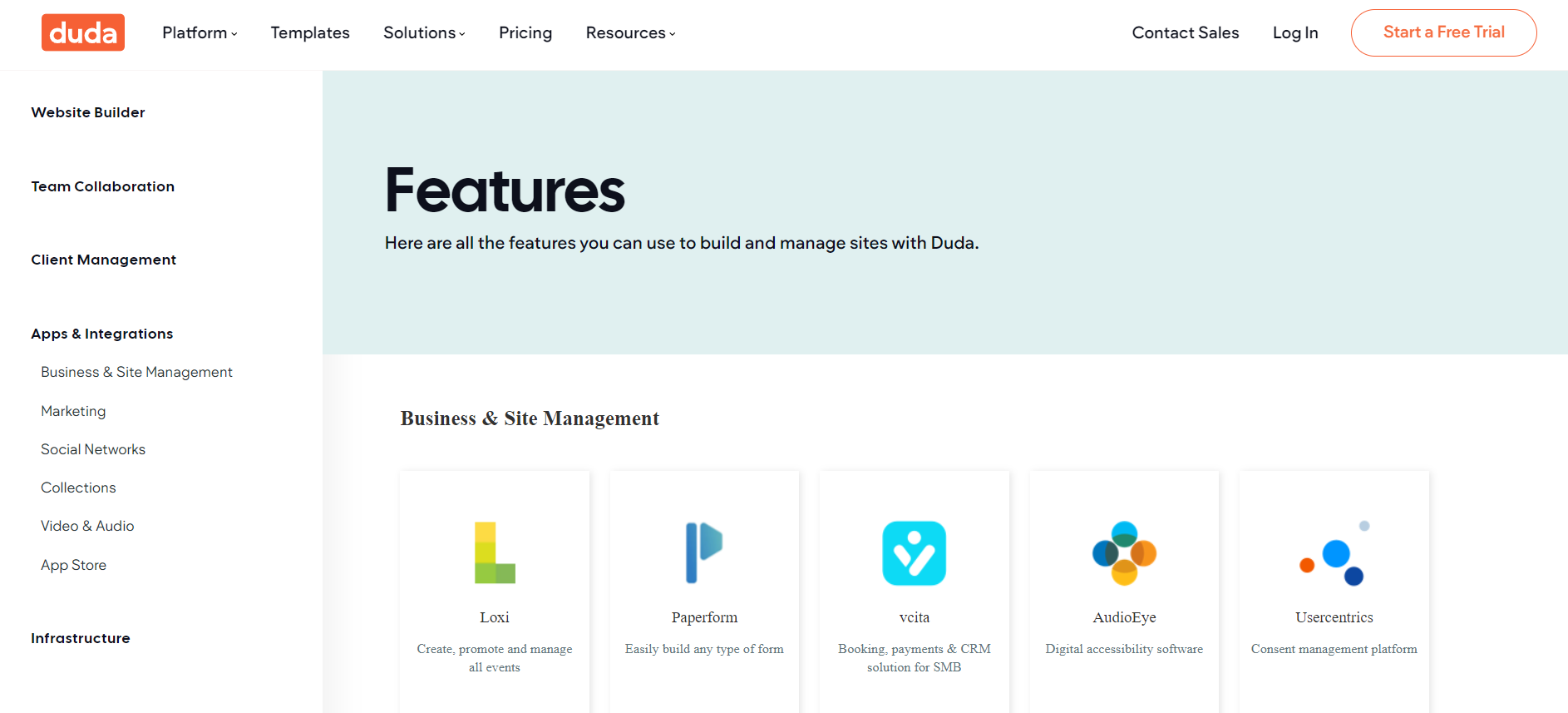
Marketing Features
Design FunctionalitiesRepresents how well each platform allows for creative design and customization of websites.Score Components:
- Template Variety (30%): Range and quality of design templates.
- Customization (30%): Flexibility and options for design alterations.
- User Interface (20%): Ease and intuitiveness of the design process.
- Responsiveness (10%): Adaptability to different devices and screen sizes.
- Innovation (10%): Unique design features and tools.
 2.6
2.6
 7.1
7.1
🏆
Overall Winner: Duda
. Duda stands out for its more advanced marketing tools, especially in SEO, email marketing, blogging, and analytics. Google Sites, while offering basic SEO and analytics, lacks in email marketing, blogging, and ads and promotions.

|

|
|
|---|---|---|
|
SEO Tools |
Basic SEO settings | Advanced SEO features |
|
Email Marketing |
No | Through integration of third party platforms |
|
Blogging |
No | Yes |
|
Social Media Integration |
Basic integration | Advanced integration with multiple platforms |
|
Analytics and Reporting |
Google Analytics integration | Supports Google Analytics for comprehensive analysis |
|
Ads and Promotions |
No | Personalization tools for promotions |
Customer Support
Customer supportEvaluates the quality and availability of support options.Score Components:
- Response time (40%): Speed of support responses.
- Support quality (30%): Effectiveness and helpfulness of the support.
- Availability (20%): Range of support channels (phone, chat, email).
- Resource richness (10%): Quality of self-help and educational materials.
 7.2
7.2
 7.5
7.5
🏆 Winner: Duda
. Comparing Google Sites vs Duda, Duda takes the lead in this category with a customer support score of 7.5. Duda offers 24/5 support through email and live chat for its Team and Agency plans, with additional support options available for Enterprise customers, including dedicated account management and business growth tools. This comprehensive support structure ensures that users have access to timely assistance and resources.
Google Sites, with a customer support score of 7.2, provides support primarily through self-service resources like a Help Center and community forums. Direct support, including phone, email, and live chat, is available to Google Workspace customers, with 24/7 support for critical issues depending on the subscription tier. While Google Sites offers robust self-help resources, its direct support options are more limited compared to Duda, especially for free users.
Security
SecurityLooks at the platforms’ security measures and data protection.Score Components:
- Data protection (40%): Safeguards for user and customer data.
- SSL and encryption (30%): Implementation of secure connections.
- Compliance (20%): Adherence to industry security standards.
- Regular updates (10%): Frequency of security updates and patches.
 9.3
9.3
 8.6
8.6
🏆
Winner: Google Sites
. Google Sites, part of the Google Workspace, offers robust security measures including SSL encryption, two-factor authentication, automatic malware scanning, and compliance with international data protection standards. Google’s infrastructure also provides DDoS protection and data redundancy, ensuring a secure environment for website creators and visitors.
Although Duda, while offering a range of security measures such as automatic SSL certificates, a Web Application Firewall (WAF), DDoS protection, and two-factor authentication, falls slightly short in comparison to Google Sites. However, Duda’s commitment to user and visitor security is commendable, making it a reliable choice for building secure websites.
AI Capabilities
AI capabilitiesMeasures the effectiveness of AI-driven features and tools.Score Components:
- Automation efficiency (40%): Impact of AI on streamlining processes.
- Personalization (30%): AI-driven customization for users or customers.
- AI-Assisted design (20%): Role of AI in website design and functionality.
- Data analysis (10%): Use of AI in interpreting user data and analytics.
 0
0
 7.3
7.3

|

|
|
|---|---|---|
|
AI Builder |
|
|
|
AI Ecommerce features |
|
AI Assistant for product and category descriptions, automated marketing emails |
|
AI Content Generation |
|
Content generation for web pages, SEO settings optimization, grammar and spelling checks, translation, meta tags generation |
|
Additional AI Features |
|
AI Content Assistant, AI SEO Assistant, AI-generated alt text for images, AI-generated sections (in beta) |
🏆 Winner: Duda
. Duda, with a score of 7.3, offers a suite of AI capabilities designed to streamline website creation and optimization. These include AI-driven content generation, SEO optimization, and ecommerce enhancements. On the other hand, Google Sites does not offer any AI capabilities.
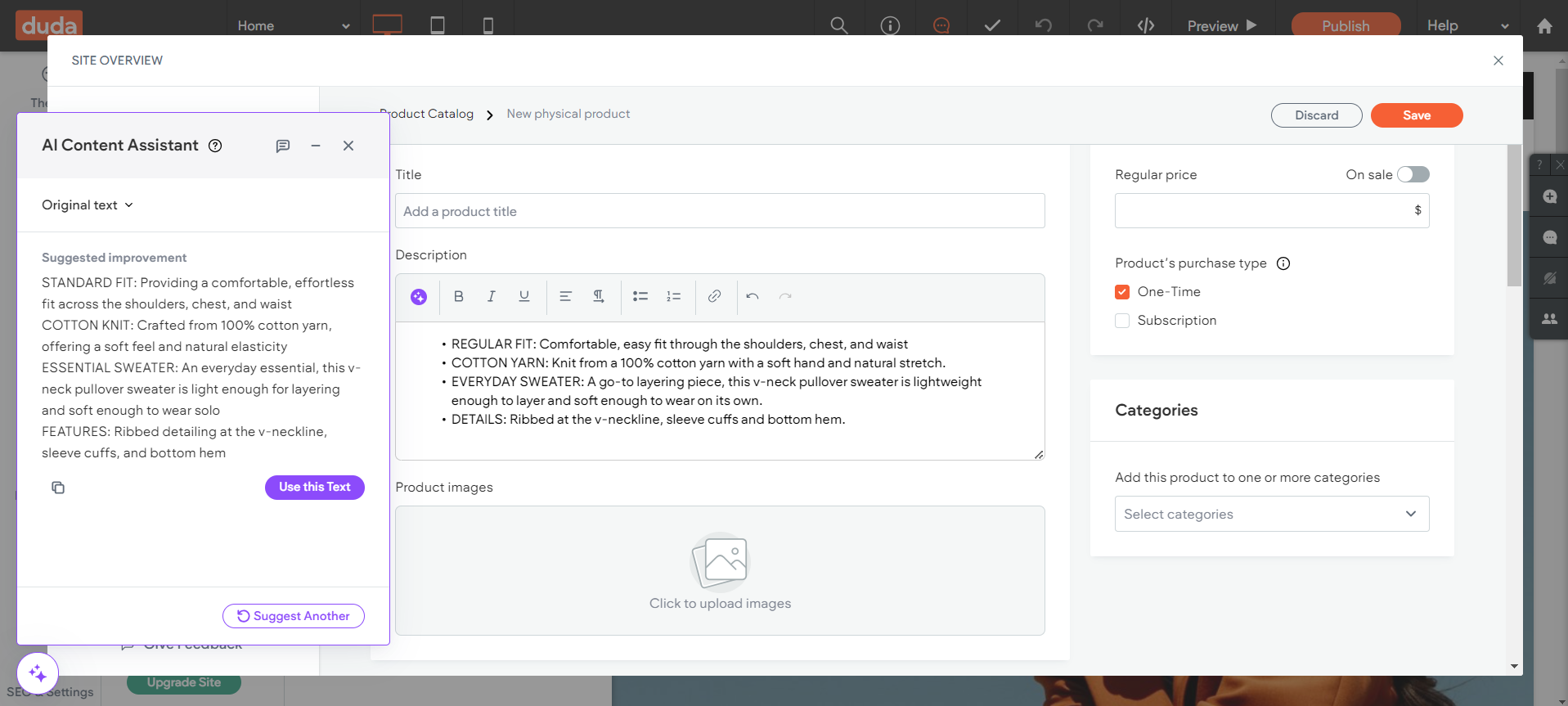
User Management
User ManagementAssesses the platforms’ capabilities in managing user roles, permissions, and accessibility.Score Components:
- Role Customization (40%): Flexibility in creating and defining user roles and
permissions. - Ease of Management (30%): User interface and tools for managing users.
- Access Control (20%): Effectiveness of access control measures for different user
levels. - Scalability (10%): Ability to manage a growing number of users efficiently.
 7.8
7.8
 8.0
8.0
🏆 Winner: Duda
. Both Google Sites and Duda offer collaborative website management, but Duda’s user management is more flexible and customizable.
- Google Sites allows multiple users to collaborate with different roles, including Owners, who have full control, and Editors, who can modify content but not site settings. There’s no strict limit on the number of users who can edit a site, allowing flexibility in management and development. Viewers can only see the site, with no editing permissions. This structure supports collaborative website building with varied levels of access and control for different users.
- Duda allows for collaborative website management, with the number of users and permissions varying by subscription plan. Higher-tier plans enable more users to participate, offering roles like Owner/Administrator, Designer, Content Editor, and Developer, each with distinct access levels. Some plans also allow for the creation of custom roles, providing flexibility in team management. For the most up-to-date details on user permissions and plan options, consulting Duda’s official resources is recommended.
Additional Features

|

|
|
|---|---|---|
|
SSL Certificate |
|
|
|
Custom Domain |
|
|
|
Free Custom Domain Included |
|
|
|
International Domains |
|
|
|
Mobile Responsive |
|
|
|
Page Speed |
|
|
|
Website Builder Mobile App |
|
|
|
Convert a Website To An App |
|
|
|
Website Analytics |
|
|
|
Multilingual Sites |
|
|
|
Multiple Users |
|
|
User Feedback
Users consistently praise Google Workspace, particularly Google Sites, for its seamless integration, ease of use, and collaborative features, making it a go-to solution for various professional and educational needs. The platform’s simplicity and user-friendly interface are lauded, enabling effortless website creation and sharing of information within organizations. While some users desire more customization options and additional features, overall, Google Workspace remains highly valued for its versatility and streamlined workflow facilitation.
Duda garners positive reviews for its user-friendly interface, extensive customization options, and responsive customer support. Users appreciate its drag-and-drop features, diverse integrations, and ability to cater to both novices and experienced developers. However, some note complexities with certain features like Duda Flex and occasional inconsistencies in design. Despite this, Duda remains a valuable tool for quick and efficient website development and management, offering a balance of ease-of-use and customization.
The making of this blog
We followed a clear, step-by-step process to write and research this article.
FAQ
Which platform is better for beginners, Google Sites or Duda?
Can I use both Google Sites and Duda for ecommerce?
How do Google Sites and Duda differ in terms of customization and design flexibility?
What are the major differences in pricing and value between Google Sites and Duda?











